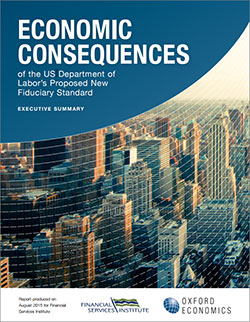Ungated Post | 18 Aug 2015
The economic consequences of the US Department of Labor’s proposed new fiduciary standard

This study focuses on the economic impact of the Department of Labor’s (DOL) proposed fiduciary rule for retirement advice on the independent financial services industry and investors who rely on independent advice. It estimates the DOL’s proposed rule will cost the independent financial services industry and investors nearly $3.9 billion in total startup costs to implement the rule – nearly 20 times DOL’s preferred cost estimate—and suggests that, if the rule is implemented, only high net-worth investors will be able to access and afford professional retirement investment advice.
About the Financial Services Institute
The Financial Services Institute (FSI) was founded in 2004 with a clear mission: to ensure that all individuals have access to competent and affordable financial advice, products and services delivered by a growing network of independent financial advisors and independent financial services firms. To find out more, please visit: www.financialservices.com.
Oxford Economics’ team is expert at applying advanced economic tools that provide valuable insights into today’s most pressing business, financial, and policy issues.
To find out more about our capabilities, contact:
Americas
Diantha Redd
+1 (646) 503 3052
Email
Asia Pacific
Peter Suomi
+65 6850 0110
Email
EMEA
Aoife Pearson
+44 (0)203 910 8054
Email
Related Services

Post
Mapping the Plastics Value Chain: A framework to understand the socio-economic impacts of a production cap on virgin plastics
The International Council of Chemical Associations (ICCA) commissioned Oxford Economics to undertake a research program to explore the socio-economic and environmental implications of policy interventions that could be used to reduce plastic pollution, with a focus on a global production cap on primary plastic polymers.
Find Out More
Post
The Economic Contribution of Mexico’s Audiovisual Industry
This report demonstrates the integral role that the AV industry plays in Mexico's economy by estimating the industry’s domestic economic footprint. The analysis comprises all aspects of the audiovisual industry, including film production, distribution, and exhibition; the production, distribution, and broadcast of television content on free-to-air and pay TV channels; and online video platforms. Our estimates provide a recent snapshot of the audiovisual industry, including impacts at the broader industry level and broken out by sub-sector.
Find Out More
Post
The socio-economic impact of TikTok in Australia
This report provides the results of our economic modelling of TikTok’s economic contribution to the Australian economy, as well as the findings of survey research into TikTok’s users and Australian businesses. It looks at the real world impacts users report as well as the diversity of TikTok’s online communities.
Find Out More